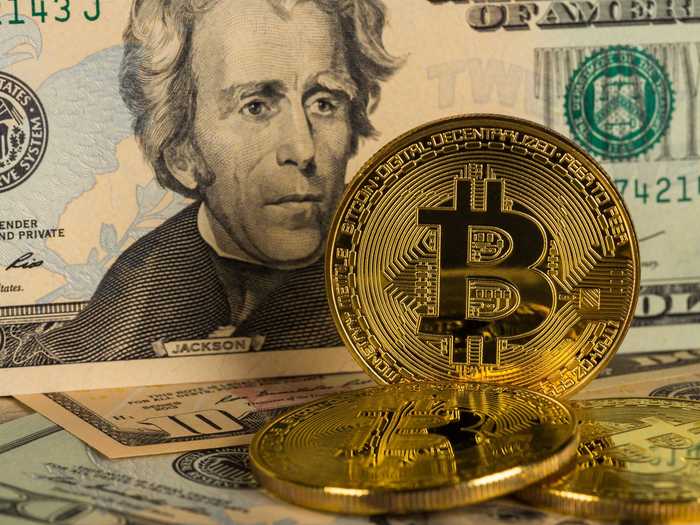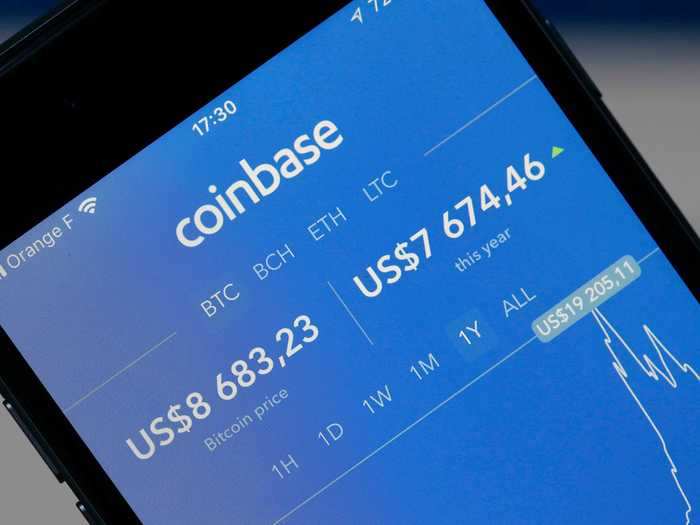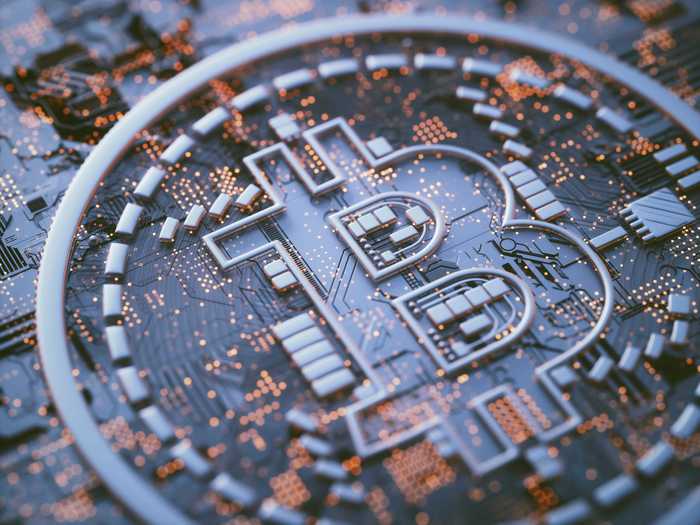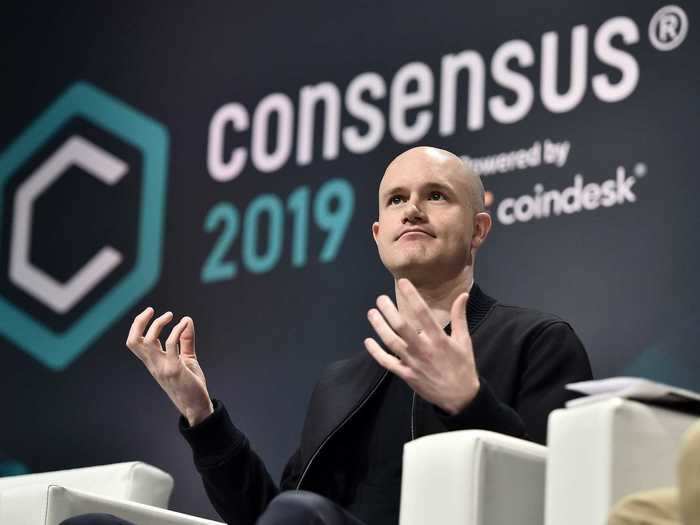Coinbase just filed to go public with a direct listing, and these are the most important details we learned about the company from its S-1

- Coinbase filed to go public on Thursday morning via a direct listing.
- The company disclosed a number of previously unknown details about its operations.
- From risks related to the mysterious Satoshi Nakamoto, to huge user numbers, here's what we learned.
Coinbase, the company behind the cryptocurrency trading platform of the same name, is going public via direct listing.
It filed S-1 paperwork on Thursday with the Securities and Exchange Commission, and that paperwork contained a variety of details about the company that were previously unknown.
From information about financials to what the company considers major risks to its future business, here are the most important things we learned:
1. It's profitable.

In 2020, Coinbase had a net income of just over $320 million — up from a loss of over $30 million the year prior.
In short: Coinbase, as of last year, is profitable. Moreover, both revenue and profit grew year-over-year.
But the company repeatedly warned against traditional readings of its financials in the S-1 filing.
"While we have benefited overall from past profitability, going forward, we may see periods of profit or loss," the filing says. "To better understand our performance, we evaluate our business, including our key metrics, over longer periods of time and across crypto asset price cycles. Due to the nature of our business and the early stage of the industry, we believe evaluating our business over longer time horizons is more informative than evaluating quarter-over-quarter fluctuations in operating results and metrics."
2. Coinbase has tens of millions of users.

As of the end of 2020, Coinbase counted 43 million verified users of its platform. Of that 43 million, just shy of 3 million were making monthly transactions on the platform.
The service is clearly very popular, and it only has intentions to grow in the years to come.
"For the foreseeable future, our intent is to reinvest profits to drive growth in both our business and the ecosystem," the company says in the filing.
Despite the high user number, Coinbase users who regularly transact still represent a small percentage — just 6.5% — of overall users. The company sees this is a potential risk going forward.
"A loss of these customers," the filing says, "or a reduction in their Trading Volume, and our inability to replace these customers with other customers, could have an adverse effect on our business, operating results, and financial condition."
3. Bitcoin's mysterious creator got several nods in the filing, including as a potential risk factor.

In addition to submitting the S-1 filing to the Securities and Exchange Commission, as well as a gaggle of lawyers and other related parties, a copy was sent to the mysterious creator of bitcoin: Satoshi Nakamoto.
The popular cryptocurrency bitcoin is said to be created by a person or people going by the name Satoshi Nakamoto, though the actual identity of its creator remains unknown.
The name appears a few times throughout the company's S-1 filing, perhaps most interestingly in the risk factors section. Simply identifying who it is could have a major impact, according to Coinbase.
"The identification of Satoshi Nakamoto," the filing says, "the pseudonymous person or persons who developed bitcoin, or the transfer of Satoshi's bitcoins," could result in major destabilization.
At least part of that is due to the massive cache of bitcoin that Nakamoto is said to have mined early on. If that cache were to be sold or transferred, it could have huge impacts on the entire bitcoin marketplace.
4. A variety of potential risks in the future, from the volatile nature of cryptocurrency to the potential for cyber attacks.

If you haven't been following the history of bitcoin and other cryptocurrencies, you might not know that it's prone to wild swings in value. Sometimes the bottom drops out suddenly, and sometimes it spikes in value by double or more.
That volatility is prime on Coinbase's risk factors list, which starts with volatility and extends to a variety of potential issues: the regulatory environment in the US and in territories around the world, the relative popularity of cryptocurrencies, the constant threat of cyber attacks, and much more.
5. Here is the founder's letter from CEO Brian Armstrong:

Economic Freedom
Coinbase is a company with an ambitious vision: to create more economic freedom for every person and business. Everyone deserves access to financial services that can help empower them to create a better life for themselves and their families, but today we are a long way from this vision.
The current financial system is rife with high fees, delays, unequal access, and barriers to innovation. In many countries, citizens don't have access to sound money, a functioning credit system, or even basic property rights. If the world economy ran on a common set of standards, that could not be manipulated by any company or country, the world would be a more fair and free place, and human progress would accelerate.
When I first read the Bitcoin whitepaper back in 2010, I realized this computer science breakthrough might be the key to unlock this vision of the future. Every payment could be as fast, cheap, and global as sending an email. Cryptocurrency could provide the core tenets of economic freedom to anyone: property rights, sound money, free trade, and the ability to work how and where they want. Economic freedom is a necessary, if not sufficient, condition for human progress. Societies with greater economic freedom have higher life expectancy and GDP growth, less war and corruption, better treatment of the environment, and higher income of the poorest 10% of people in society. Higher economic freedom correlates with the kind of societies that we all aspire to create. Our job at Coinbase is to help make this future a reality.
The Cryptoeconomy
What started with Bitcoin has spawned an entire industry with countless different blockchains and tokens. We now have stablecoins, privacy coins, security tokens, reward tokens, governance tokens, and smart contracts. We're seeing the digitization of all types of value in a new economy that we call the cryptoeconomy.
Trading and speculation were the first major use cases to take off in cryptocurrency, just like people rushed to buy domain names in the early days of the internet. But we're now seeing cryptocurrency evolve into something much more important. People are using cryptocurrency to earn, spend, save, stake, borrow, lend, vote, and perform many other types of economic activity. Companies are being funded, getting early customers, and will eventually go public, all on the blockchain. The cryptoeconomy is just getting started. It is not intended to replace the traditional economy, but instead be a complement to it, much like email was to paper mail. The cryptoeconomy offers a more global, free, and fair alternative to traditional economies that is native to the internet.
A Safe, Trusted, and Easy-to-Use Platform
Coinbase is building the infrastructure to power the cryptoeconomy, helping bring the benefits of this new technology to the world. Today, you could think of our products as a safe and easy-to-use platform to buy, sell, store, save, spend, and use cryptocurrency. But for many of our customers, they simply think of us as their primary financial account in the cryptoeconomy. Coinbase is building a portfolio of different products and services that connect to this primary financial account, and we're enabling third party products and services to be connected as well. We seek to make all of our products and services the most trusted and easiest to use in the industry.
Trust is critical when it comes to storing money. From the early days, we decided to focus on compliance, reaching out to regulators proactively to be an educational resource, and pursuing Licenses even before they were needed. We invested heavily in cybersecurity, built novel key storage mechanisms, and obtained a cybercrime insurance policy. We even developed ways for customers to custody their own cryptocurrency safely, so they didn't need to trust us at all. Most importantly, we built a culture that doesn't take shortcuts or try to make a quick buck.
Ease of use is our other major area of focus. Cryptocurrency is still much too difficult to use for the average person. In the same way that people can access the internet without understanding how TCP/IP works, or turn on a Light switch without understanding how electricity works, they need to be able to use cryptocurrency without understanding the underlying complexity. We accomplish this by continually finding ways to simplify our products and pushing for new standards in the industry that improve usability.
Trust and ease of use will be as relevant in ten years as they are today, and our work here will never be done. We may not always move the fastest, or offer the Lowest prices, but if we accomplish our goal of being the most trusted and easiest to use, customers will continue to choose our products and services now and in the future.
Building for the Long Term
It is the very early days of this industry, and Coinbase has always taken a Long-term view. We are squarely focused on delivering the best crypto experience to our customers. Today, we are investing in growth because we believe that scale is critical to achieving the potential of our business model.
You can expect volatility in our financials, given the price cycles of the cryptocurrency industry. This doesn't faze us, because we've always taken a long-term perspective on crypto adoption. We may earn a profit when revenues are high, and we may Lose money when revenues are Low, but our goal is to roughly operate the company at break even, smoothed out over time, for the time being. We are Looking for Long-term investors who believe in our mission and will hold through price cycles.
Our goal is to build a portfolio of products and services with efficient capital allocation and to demonstrate repeatable innovation. We have done this before, taking the profits from our early products and services and reinvesting them into new products and services that we believe help accelerate our vision of the future. We will continue to make investments in new products and services when we see a sufficient probability of gaining market Leadership. Some of these investments will pay off, others will not. We will measure our products and services and the effectiveness of our investments analytically, and shut down products and services that do not provide expected returns. We will Learn from our successes and mistakes, and use those learnings to inform our decision making in the future. We hope this perspective will make us more profitable in the Long run as we see the full scale of this industry unfold.
Thank you,
Brian Armstrong
CEO, Coinbase
READ MORE ARTICLES ON
Popular Right Now
Advertisement